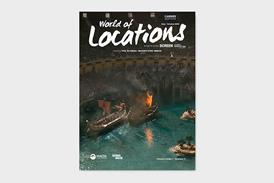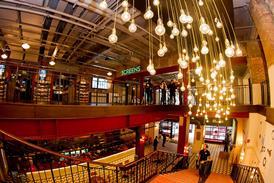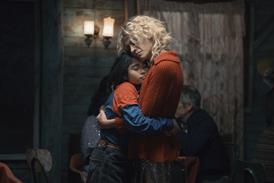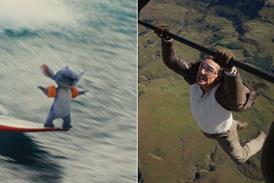Northern Ireland is undergoing a local and international production boom.
From its strong crew base and breathtaking rural locations, to its financial incentives and studio space, Northern Ireland is fast becoming one of the most attractive filming locations for international productions looking for a cost effective and film-friendly base in Europe.
The region is also starting to build up its indigenous industry, with a number of locally based production companies and post-houses popping up and a crop of high-profile films set to come out of Northern Ireland this year, including Terry George’s heist comedy Whole Lotta Sole; Lisa Barros D’Sa and Glenn Leyburn’s Good Vibrations, a biopic of punk godfather Terri Hooley; and Lionsgate’s Keith Lemon: The Film, all of which were produced and shot in Belfast with funding from government-backed agency Northern Ireland Screen. And it is not just feature films that are attracted to Northern Ireland: Belfast is also becoming a hub for television
production, with HBO set to return there to shoot season 3 of the Emmy-winning Game Of Thrones this summer and a slew of UK television dramas being filmed in the region including The Fall, a Belfast-set police drama series starring Gillian Anderson, and PG Wodehouse-inspired series Blandings, both for the BBC. The UK government’s promise to introduce a tax credit for high-end TV drama by April 2013 is likely to provide an even bigger draw.
“We think it’s a pretty fabulous place to make films. There are great crews, it’s a very film-friendly environment and the people aren’t jaded,” says producer Mark Huffam, who returned to Belfast in 2008 to set up production company Generator Entertainment, together with Simon Bosanquet and Aidan Elliott, producing a combination of big-budget international productions along with local fare such as Red Mist and Whole Lotta Sole.
With his strong international connections, Huffam’s presence in the region has proved a key factor in attracting big-budget shoots to Belfast, including Universal¹s medieval comedy feature Your Highness which based itself in Belfast between July and November 2009 and Game Of Thrones.
“It is vital to have that credible voice in the region and that, combined with the great crews and the incentives, has really helped put us on the map,” says Andrew Reid, head of production at Northern Ireland Screen, which has been equally instrumental in the upsurge of production in the region over the last few years. Formerly known as the Northern Ireland Film and Television Commission, the agency shifted up a gear in 2007 when it changed its name and launched a new strategy, ‘Building on Success’, attracting its first big US production, City Of Ember, to the region while also backing arthouse films such as Steve McQueen’s 2008 Cannes Camera d’Or winner Hunger.
‘People in Belfast are starting to believe that they have the talent’
Andrew Eaton, Revolution Films
From 2010 to the end of March 2012, Northern Ireland Screen has invested $15.6m (£9.8m) worth of production funding through its Screen Fund, resulting in an estimated total Northern Irish spend of $93.4m (£58.8m) and putting back an estimated $9.50 (£6) into the Northern Irish economy for every $1.60 (£1) it invested. Northern Ireland Screen’s usual maximum investment per project is $1.3m (£800,000), which is made in the form of a recoupable loan. Projects must have 65% of their budget in place, shoot partially in Northern Ireland and demonstrate the potential for economic benefit to the region, as well as passing the British Film Institute’s
cultural test.
Projects backed by Northern Ireland Screen have included Nick Hamm’s Killing Bono and Jon Wright’s monster comedy Grabbers, which shot in Belfast last summer and world premiered at Sundance in January.
The agency invests $4.8m (£3m) annually into its Irish-language broadcast fund (which backs Irish-language content) and $1.6m (£1m) via its Ulster-Scots broadcast fund, which was set up to preserve the Ulster-Scots heritage language and culture.
As part of its remit to support local talent, Northern Ireland Screen also offers script development funding to local writers and production companies: $3,572 (£2,250) to individuals, $63,500 (£40,000) to companies, and slate funding of up to $159,000 (£100,000).
One of Belfast’s unique selling points is its vast studio facility - The Paint Hall - which is based in the city’s former shipbuilding quarter. Once used to paint the ships assembled by Harland and Wolff, which built The Titanic, the space now offers four stages each measuring 16,000 square feet. Walden Media and Playtone Productions’ children’s sci-fi epic City Of Ember was the first large-scale production to use the space in 2007, paving the way for Your Highness and Game Of Thrones. The addition of two new adjacent sound stages this year means the area will be able to accommodate more than one project at a time.
The proximity of Belfast to such varied landscapes - from the Mourne Mountains to the Antrim coast - has also acted as a draw for large-scale international productions.
“People are starting to realise how easy it is to film here. You don’t need all the permits and red tape and everybody is so helpful,” says producer Chris Martin, who recently set up Belfast production company Canderblinks with Lisa Barros D’Sa, Glenn Leyburn and composer David Holmes, to produce Good Vibrations with London-based Revolution Films.
Lionsgate UK’s head of production and acquisitions Nick Manzi, who brought Generator on board to produce the company’s upcoming comedy Keith Lemon: The Film, which recently wrapped in Belfast, has been delighted with the results. “[Working in Northern Ireland] was very business-like and straightforward and it was very smooth. I’d say the industry there isn’t up and coming, it’s already arrived.”
Keith Lemon: The Film, starring comedian Leigh Francis as his alter-ego Celebrity Juice TV presenter Keith Lemon, shot for six weeks in Belfast with a few pick-up days in London. “Coming back to London after being in Belfast for six weeks was a reminder of how much easier it is in Belfast, both logistically and in terms of cost,” says Generator’s Aidan Elliott, who together with Huffam and Bosanquet divides his time between Belfast and London, made easier by the hour’s flight between the two cities.
Ascending the Throne
Despite being based in New York, Belfast-born Terry George - who won an Oscar this year for his live-action short The Shore - says he is always on the lookout for projects to shoot in Northern Ireland, whether set in the region or not. “I am developing an American courtroom drama and I would seriously think about shooting the interiors in Belfast. It would be much cheaper than New York and it would only be a matter of taking principal cast and crew, because the rest of the crew is there.”
The region’s growing crew base is thanks partly to HBO’s Game Of Thrones setting up in the region, employing up to 400 crew members per season. The show has been crucial in training - and maintaining - those local crew members who might previously have been tempted to move to Dublin or London to find more work.
“The crew base is getting bigger all the time, yes it still needs to grow. But if the work is there, that will follow,” says Huffam. Having Belfast-based international sales companies or distributors could also fuel growth in the future.
For producer Andrew Eaton, who grew up in Northern Ireland during the Troubles before moving to London to set up Revolution Films with Michael Winterbottom, one of the biggest changes has been the attitude of the city.
“When we were filming Good Vibrations, I couldn’t believe the difference in the city,” says the producer, who would nevertheless like to see “more depth of crew and entrepreneurial producers in the region who have the drive and connections to make good things happen”.
London-based TV production outfit Mammoth Screen has just shot its third production in the region, the BBC drama Blandings, with backing from Northern Ireland Screen. “Regional incentives in the UK have dried up, [production] budgets aren’t getting any smaller and broadcast licence fees aren’t getting any bigger, so companies like us are constantly looking for help with funding,” says Jon Williams, director of production and finance at Mammoth.
Still, financial incentives on their own would not be enough to lure the company to the region, says Williams. “We wouldn’t go somewhere that we didn’t believe had a sufficient crew base, and the fact we have produced in Northern Ireland for three years in a row shows our commitment to the region.”
One of the biggest challenges for Northern Ireland Screen is balancing the need to bring in international productions with keeping local producers happy. However Northern Ireland Screen’s CEO Richard Williams says “it is actually a false distinction, because the inward investment work underpins the justification for everything else”.
“Our policy from day one has been a twin-track approach. We bring in the incoming projects which provide economic benefits and build up facilities and infrastructure which go towards supporting indigenous companies,” adds Northern Ireland Screen’s Reid.
When it comes to supporting local companies, Reid believes BBC Northern Ireland - the BBC’s outpost in the region - could do more. “The BBC should be actively working with local companies and talent to get them to the stage where they would feel comfortable commissioning them, by pairing them up with companies they feel have credibility to deliver drama, or through training.”
“For a long time, BBC Northern Ireland drama was made anywhere other than Northern Ireland because they argued there wasn’t the infrastructure,” adds Greg Darby, who runs local post-production company Yellow Moon, which handles post for Game Of Thrones. “But when HBO can come in and deliver 20 episodes, it puts pressure on the local broadcasters to commit to doing more things here,” he adds.
Investment in training
Williams thinks grassroots training and education is the key to building a sustainable local industry. As part of its skills development strategy, Northern Ireland Screen provides an annual scholarship for one local film-maker to attend the National Film and Television School in England, as well as funding a delegation of local producers to attend major festivals. The agency also works in partnership with the Northern Ireland Skillset Media Academy, and offers a skills bursary of up to $3,220 (£2,000) to individuals for local film courses.
The investments are starting to pay off. “We see the quality of work coming out of universities and colleges is much higher. They are hungrier, more focused, and they get exposure to things being made here,” says Williams. “There is nothing like tangible evidence to make people believe.” With HBO set to return this summer for Game Of Thrones and a number of big-budget productions in talks to shoot in the region, it is now about maintaining and growing the industry.
“The most important thing is that people in Belfast are beginning to have the confidence and are starting to believe they have the talent,” says Eaton.
Contact details: Northern Ireland Screen - info@northernirelandscreen.co.uk; +44 (0) 28 9023 2444





























![[Clockwise from top left:] Francois Ozon, Benjamin Voisin, Swann Arlaud, Pierre Lottin, Rebecca Marder, Denis Lavant](https://d1nslcd7m2225b.cloudfront.net/Pictures/100x67/5/7/6/1451576_thestrangerv2_631475.jpg)


No comments yet